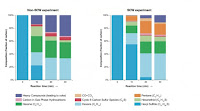Supercritical water upgrading (SCWU) of heavy oils has been of interest for years in industry and academia; SCWU reduces sulfur content and decreases average molecular weight or crude without rejecting carbon as coke products.
...
More than a third of the world’s energy needs are met using oil; reliance on oil will likely continue for decades to come, especially in the transportation sector. Increasingly, however, crude oil tends to be heavier, and higher in sulfur, than the lightweight, clean, and easily refined crudes produced in the past. When refined, these heavier, more sour crudes yield a higher fraction of lower-value, heavier products such as asphalt along with residual coke.
Processes now used to upgrade and desulfurize heavy crude oil are expensive, energy-intensive, and require hydrogen, which companies typically produce from natural gas—a high-cost process that consumes valuable gas resources and releases high levels of CO2.
So there’s a lot of interest in finding alternative processes for converting low-quality crude oil into valuable fuels with less residual coke and for removing the sulfur efficiently and economically without using hydrogen.SCWU uses water rather than natural gas as the source of the hydrogen molecules needed for the key chemical reactions in the refining process. Although oil and water don’t normally mix, using supercritical water solves that problem.
—Ahmed Ghoniem, the Ronald C. Crane ('72) Professor of Mechanical Engineering at MIT}
Read more at Making Clean, High-Quality Fuels from Low-Quality Oil

No comments:
Post a Comment